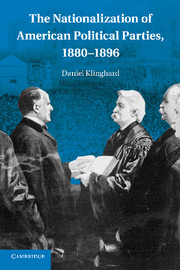Book contents
- Frontmatter
- Contents
- Preface
- Acknowledgments
- Introduction
- 1 Localism and the Jacksonian Mode
- 2 The Nineteenth-Century Associational Explosion and the Challenge to the Jacksonian Mode
- 3 Organizational Transformation and the National Parties
- 4 National Campaign Clubs and the Party-in-the-Electorate
- 5 Grover Cleveland and the Emergence of Presidential Party Leadership
- 6 Party Transformation in the Republican Party
- Conclusion
- Selected Bibliography
- Index
- References
Conclusion
Published online by Cambridge University Press: 06 July 2010
- Frontmatter
- Contents
- Preface
- Acknowledgments
- Introduction
- 1 Localism and the Jacksonian Mode
- 2 The Nineteenth-Century Associational Explosion and the Challenge to the Jacksonian Mode
- 3 Organizational Transformation and the National Parties
- 4 National Campaign Clubs and the Party-in-the-Electorate
- 5 Grover Cleveland and the Emergence of Presidential Party Leadership
- 6 Party Transformation in the Republican Party
- Conclusion
- Selected Bibliography
- Index
- References
Summary
This narrative of the emergence of the late-nineteenth-century party mode is not intended to suggest that twentieth-century parties emerged full-fledged from the late nineteenth century. Post-1900 American parties were still structured in part by the Jacksonian organizational mode, and its organization continued to reflect elements of the republican orientation of its founders. However, party leaders – and reformers – thought differently about the appropriate role of the national party organizations, and this different way of thinking shaped much of twentieth-century party change. This is not to suggest that they had become good liberals but that they had come to accept the application of certain liberal operating principles to party politics.
Some elements of their conception of the role of the national party organizations were fleeting. Campaigns did not retain the public language of education or the thick instruction provided in late-nineteenth-century campaign documents (although in their insistence on articulating clear policies and reaching voters in a private capacity, these campaigns would be more familiar to voters today than the hurrah campaign or the still hunt). As explained in Chapter 4, the national party club networks failed to achieve a lasting place in the party system (although the conceptualization of a national party-in-the-electorate, responsible chiefly to the national party, is much closer to today's conception of party than is the nineteenth-century vision of local partisan communities bound together chiefly by geographic ties).
- Type
- Chapter
- Information
- The Nationalization of American Political Parties, 1880–1896 , pp. 235 - 258Publisher: Cambridge University PressPrint publication year: 2010



